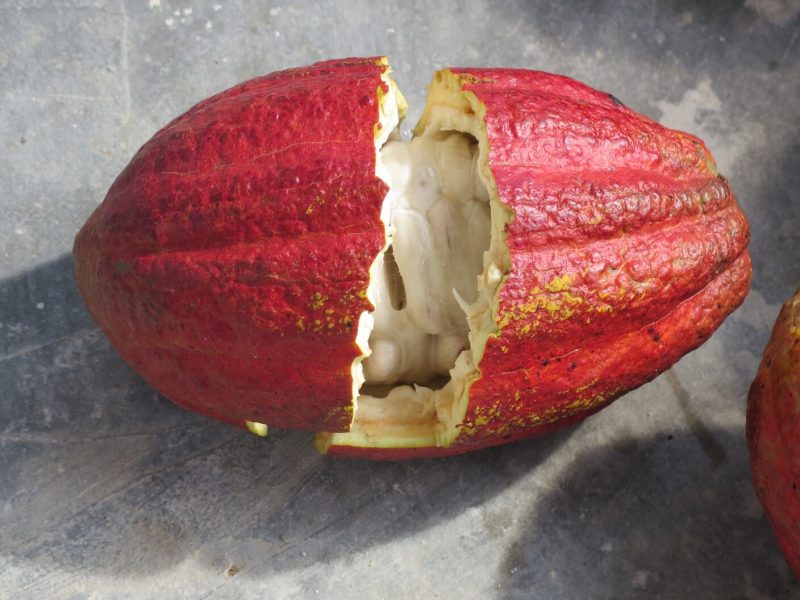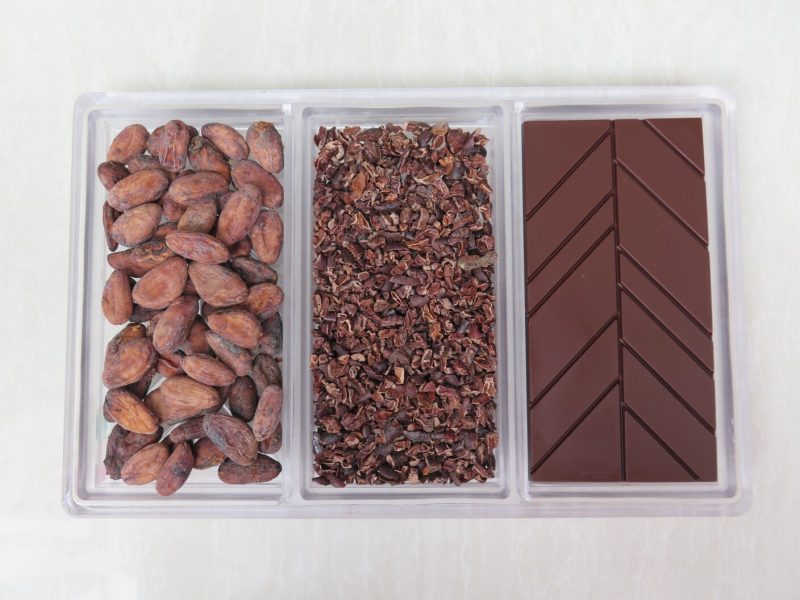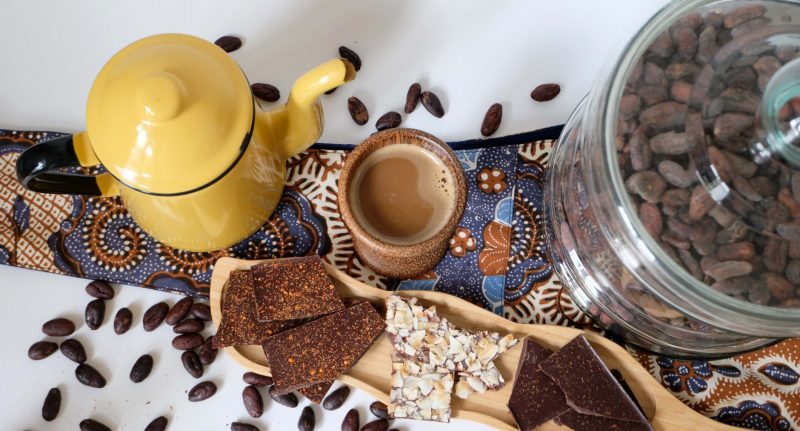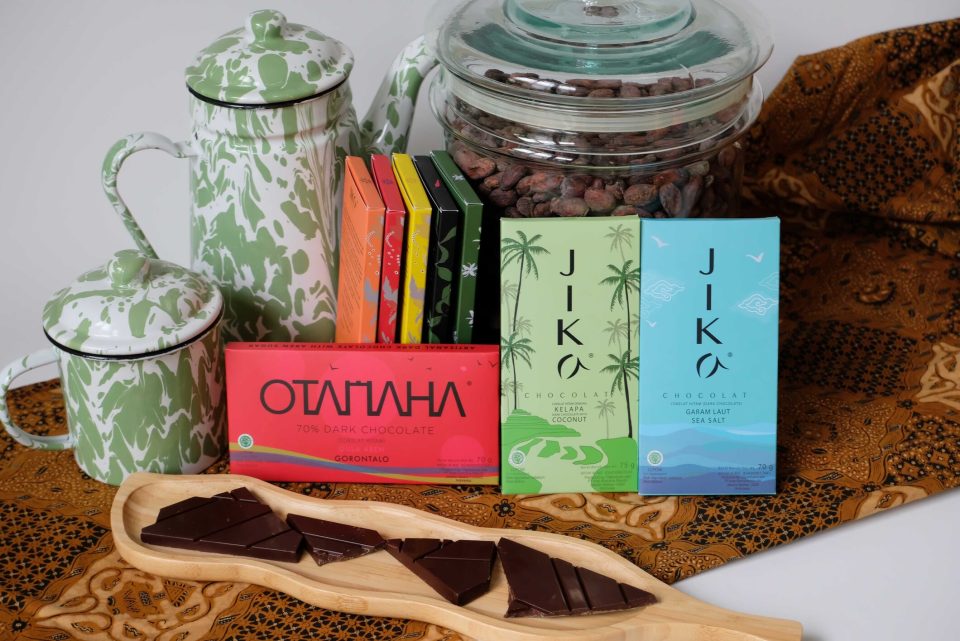Southeast Asia produces approximately 14 percent of the world’s chocolate – most of which comes from Indonesia.
Baldwin and Sury are looking to put Indonesian cacao on the map. In 2017, they founded Jika Chocolat, a bean-to-bar company that creates single-origin chocolate using exclusively Indonesian beans and develops close relationships with farmers.
The company says its mission is to: Be an artisan chocolate maker based in Indonesia and work in close collaboration with farmers, cooperatives, and cacao experts. Jika Chocolat aims to make Indonesian chocolate a widely recognised origin for gourmet chocolate together with the other bean to bar makers in the country.
History
Cocoa trees are native to the Americas, specifically at the foot of the Andes mountains in the basin of the Amazon and Orinoco rivers, South America. The evidence of cocoa trees that were once widespread in Central America was strengthened by the findings of a clay handicraft dated 1400-1500 BC, which was found at the excavation of an archaeological site indicating residual deposits of cocoa. In addition, the sweet chocolate flesh or cocoa pulp was fermented to make a type of beverage and cocoa beans, thus becoming the currency at that time.


Theobroma, which became the genus name of the chocolate tree, has the meaning of “the food of the Gods”. Chocolate was then introduced to Europe by Spanish explorers and became a famous drink in the mid-17th century. Chocolate plants were then transported and cultivated to European colonies in Southeast Asia and West Africa.
In Indonesia
Cocoa was introduced in 1560 to North Sulawesi, originating from the Philippines. The first type of cocoa plant was called criollo, which the Spaniards brought from Venezuela. That cocoa production is relatively low and sensitive to pests and diseases, but it tasted good. In 1806, cocoa expansion efforts began again in East Java and Central Java. Planting was done on the side fields of coffee planting areas.
The development of cocoa plants in Indonesia, especially in Java, grew rapidly. In 1938, there were 29 cocoa plantations with 13 plantations in West Java, seven plantations in Central Java, and nine plantations in East Java. The development was also encouraged by the widespread diseases of rust coffee leaves by hemileia vastatrix, causing the destruction of coffee plantation areas in Java that forced them to plant cocoa instead.
The founders
Baldwin and Sury met in China and discovered their mutual passion for chocolate. After a few years together, they started learning the history of Indonesian cacao. The pair began educating themselves on the product by speaking with farmers and then eventually formed their mission. Jika Chocolat is trying to bring something great to the chocolate world by creating high quality, single-origin chocolate bars from Indonesian beans that are produced, packaged, and shipped from Indonesia. The picture shows the bars and a look at the creation of their beautiful packaging, which is done in Indonesia as well.


Sustainable and environmental impact model
We could argue that not only would cacao provide a good opportunity for all farmers in Indonesian villages to increase their income, but it will also provide some degree of crop diversification in villages. Furthermore, it could help Indonesian villages mitigate water shortage problems, especially because cacao would need much less water than coffee.
Jika Chocolat is aware of both of these benefits of Indonesian cacao. Crop diversification is very important in any agriculturally based society. One major source of the economic problems in cacao growing countries in Africa is the lack of crop diversification. The mono-crop societies in Africa are at the whim of the rise and fall of cacao market prices, which has created an unstable industry rife with corruption and labour problems.
The expansion and support of high-quality cacao in Indonesia will have a positive impact on the environment because in an agroforestry system, as the cacao tree and the other components grow to maturity, the agroforestry becomes a more diverse and structurally complex, closed-canopy multi-strata system that resembles a natural forest.
Jika Chocolat believes they are contributing to this agroforestry model, saying the success story of the Indonesian economy in the past 20 years is based on a dynamic agricultural base with small farmers. This approach is designed to have long-term benefits for both the environment and the farmers. Apart from learning how to grow cacao, a very tricky crop, the new skills developed can transfer to exploring the growth of other new crops, since most of their cacao farms are no larger than two hectares.


One problem is that it is a luxury good, running around Rp55,000 per bar, so much of the population cannot afford it. Secondly, Indonesians generally view products from their country as low quality. A chocolate enthusiast based in Jakarta spoke of Jika Chocolat’s lack of local popularity saying, “The Indonesian consumer does not trust the product of their own country yet… [they have a] preference for imported goods which are perceived as higher quality but things are getting better and hopefully in the years to come, Indonesian bean to bar chocolates will be sought.”
To conclude
Jika Chocolat artisan chocolate has great potential. In the five years of the company’s existence, they have made a splash in the chocolate market with their beautifully packaged single-source bars. They do make one single-source bar marketing the “uniqueness” of the “exotic” product, Jika Chocolat is committed to being a part of Indonesia’s agriculture and economy. While a few more years of operation will give a clearer picture, the model Jika Chocolat has created with their company is innovative and a part of the solution to making chocolate that is positive for all those involved – from the farmers to the consumers.




